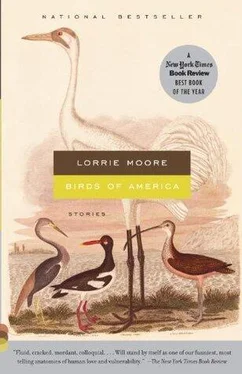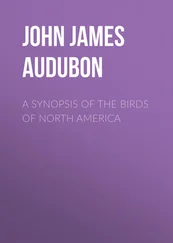But she didn’t know any men in town. Why didn’t she know one?
In mid-June, the house he chose was an old former farmhouse in the middle of a subdivision. It was clearly being renovated — there were ladders and tarps in the yard — and in this careless presentation, it seemed an easy target. Music lovers! he thought. They go for renovation! Besides, in an old house there was always one back window that, having warped into a trapezoid, had then been sanded and resanded and could be lifted off the frame like a lid. When he worked for the lawn company, he’d worked on many houses like these. Perhaps he’d even been here before, a month ago or so — he wasn’t sure. Things looked different at night, and tonight the moon was not as bright as last time, less than full, like the face beneath a low slant hat, like a head scalped at the brow.
· · ·
Noel looked at the couple. They had started singing “Chattanooga Choo-Choo.” Lately, to save time, inspire the singers, and amuse himself, Noel had been requesting duets. “Wait a minute,” he interrupted. “I wanna write this one down. I’ve just started to write these things down.” And, like a fool, he left them to go into the next room to get a pen and a piece of paper.
“You have a sweet voice,” the woman said when he returned. She was standing in front of the nightstand. He was smoothing a creased piece of paper against his chest. “A sweet speaking voice. You must sing well, too.”
“Nah, I have a terrible voice,” he said. He felt his shirt pocket for a pen. “I was always asked to be quiet when the other children sang. The music teacher in grade school always asked me just to move my lips. ‘Glory in eggshell seas,’ she would say. ‘Just mouth that.’ ”
“No, no. Your voice is sweet. The timbre is sweet. I can hear it.” She took a small step sideways. The man, the husband, stayed where he was. He was wearing a big red sweatshirt and no underwear. His penis hung beneath the shirt hem like a long jewel yam. Ah, marriage . The woman, thrusting her hands into the pockets of her nightgown, took another small step. “It’s sweet, but with weight.”
Noel thought he could hear some people outside calling a dog by clapping their hands. “Bravo,” said the owner of the dog, or so it sounded. “Bravo.”
“Well, thank you,” said Noel, his eyes cast downward.
“Surely your mother must have told you that,” she said, but he decided not to answer that one. He turned to write down the words to “Chattanooga Choo-Choo,” and with the beginning of the tune edging into his head— pardon me, boys —something exploded in the room. Suddenly, he thought he felt the yearning heart of civilization in him, felt at last, oh, Nitchka, what human experience on this planet was all about: its hard fiery center, a quick rudeness in its force; he could feel it catching him, a surprise, like a nail to the brain. A dark violet then light washed over him. Everything went quiet. Music, he saw now, led you steadily into silence. You followed the thread of a song into a sudden sort of sleep. The white paper leapt up in a blinding flash, hot and sharp. The dresser edge caught his cheekbone in a gash, and he seemed no longer to be standing. His shoes slid along the rug. His hands reached up, then down again, then up along the dresser knobs, then flung themselves through the air and back against the floor. His brow, enclosing, then devouring his sight, finally settled dankly against his own sleeve.
Heat drained from his head, like a stone.
A police car pulled up quietly outside, with its lights turned off. There was some distant noise from geese on the pond.
There was no echo after the explosion. It was not like at the range. There had been just a click and a vibrating snap that had flown out before her toward the mask, and then the room roared and went silent, giving back nothing at all.
Terence gasped. “Good God,” he said. “I suppose this is just what you’ve always wanted: a dead man on your bedroom floor.”
“What do you mean by that? How can you say such a heartless thing?” Shouldn’t her voice have had a quaver in it? Instead, it sounded flat and dry. “Forget being a decent man, Terence. Go for castability. Could you even play a decent man in a movie?”
“Did you have to be such a good shot?” Terence asked. He began to pace.
“I’ve been practicing,” she said. Something immunological surged in her briefly like wine. For a minute, she felt restored and safe — safer than she had in years. How dare anyone come into her bedroom! How much was she expected to take? But then it all left her, wickedly, and she could again feel only her own abandonment and disease. She turned away from Terence and started to cry. “Oh, God, let me die,” she finally said. “I am just so tired.” Though she could hardly see, she knelt down next to the masked man and pressed his long, strange hands to her own small ones. They were not yet cold — no colder than her own. She thought she could feel herself begin to depart with him, the two of them rising together, translucent as jellyfish, leaving through the air, floating out into a night sky of singing and release, flying until they reached a bright, bright spaceship — a set of teeth on fire in the dark — and, absorbed into the larger light, were taken aboard for home. “And what on earth was all that?” she could hear them both say merrily of their lives, as if their lives were now just odd, noisy, and distant, as in fact they were.
“What have we here?” she heard someone say.
“Look for yourself, I guess,” said someone else.
She touched the man’s black knit mask. It was pilled with gray, like the dotted swiss of her premonitions, but it was askew, misaligned at the eyes — the soft turkey white of a cheekbone where the eye should be — and it was drenched with water and maroon. She could peel it off to see his face, see who he was, but she didn’t dare. She tried to straighten the fabric, tried to find the eyes, then pulled it tightly down and turned away, wiping her hands on her nightgown. Without looking, she patted the dead man’s arm. Then she turned and started out of the room. She went down the stairs and ran from the house.
Her crying now came in a stifled and parched way, and her hair fell into her mouth. Her chest ached and all her bones filled with a sharp pulsing. She was ill. She knew. Running barefoot across the lawn, she could feel some chaos in her gut — her intestines no longer curled neat and orderly as a French horn, but heaped carelessly upon one another like a box of vacuum-cleaner parts. The cancer, dismantling as it came, had begun its way back. She felt its poison, its tentacular reach and clutch, as a puppet feels a hand.
“Mitzy, my baby,” she said in the dark. “Baby, come home.”
Though she would have preferred long ago to have died, fled, gotten it all over with, the body — Jesus, how the body! — took its time. It possessed its own wishes and nostalgias. You could not just turn neatly into light and slip out the window. You couldn’t go like that. Within one’s own departing but stubborn flesh, there was only the long, sentimental, piecemeal farewell. Sir? A towel. Is there a towel? The body, hauling sadnesses, pursued the soul, hobbled after. The body was like a sweet, dim dog trotting lamely toward the gate as you tried slowly to drive off, out the long driveway. Take me, take me, too , barked the dog. Don’t go, don’t go , it said, running along the fence, almost keeping pace but not quite, its reflection a shrinking charm in the car mirrors as you trundled past the viburnum, past the pine grove, past the property line, past every last patch of land, straight down the swallowing road, disappearing and disappearing. Until at last it was true: you had disappeared.
Читать дальше












